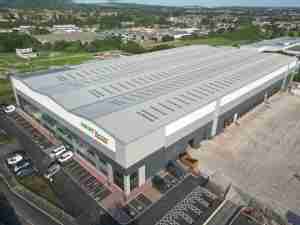China considers opening up commodity warehousing
posted by AJOT | Jul 09 2013 at 08:00 PM | Logistics
China's top planning body is considering allowing foreign exchanges to set up commodities warehouses in the country's free-trade zones, two sources with links to the government said.
China is the top consumer of most raw materials and warehouses linked to foreign exchanges there would further increase the influence of the world's second-largest economy over commodities trade and accelerate the opening of China's commodities markets to foreign investors.
The London Metal Exchange (LME), the world's biggest marketplace for base metals, is likely to be the first foreign exchange to open warehouses in the newly approved free-trade zone in Shanghai, the sources said.
The Hong Kong Exchanges and Clearing (HKEx) bought the LME last year, a symbolic shift to the emerging economy of China for the institution established during the height of Britain's manufacturing boom in the 1800s.
Allowing foreign exchanges such as the LME to set up warehouses in free trade zones would circumvent current regulations that ban foreign bourses from setting up depots in mainland China.
The change would encourage China's huge industry to use LME metals contracts to manage international price risk, thereby boosting trading volumes for new owner HKEx.
"The National Development and Reform Commissions (NDRC) is definitely going to bring the LME into China," said one of the sources, who has knowledge of the government's free-trade zone policy.
The NDRC is working on guidelines for the new policy to allow the LME to operate warehouses in Shanghai and other free-trade zones, the source said.
The plan also fits into Beijing's aims to internationalise the yuan, the sources said. China recently approved free trade zones as a part of that plan.
Boosting the logistics business in the free-trade zones was expected to bring more international banks into the zones, one source said.
"Trade is always linked to financing, which has to be done by big banks. That also relates to the yuan going into the international market," he said, declining to be named because he was not authorised to talk about the topic.
Challenges Shanghai Exhange
LME warehouses in Shanghai would challenge the dominance of the local rival, the Shanghai Futures Exchange (ShFE).
The LME has sought for many years to set up delivery networks in China to grow its business.
"The extension of the LME's warehouse network into mainland China is an important issue for the LME and its members. The LME and HKEx are working on the initiative with high priority," a spokesperson at HKEx said.
Having warehouses in China will allow sellers of copper on the LME to deliver against those contracts into the Chinese mainland. At present, the closest they can deliver to China against LME contracts is South Korea and Taiwan.
"Shanghai would have to show to Beijing a landmark project in the free-trade zone soon. It may announce the first LME warehouse before the end of this year," said another source with links to the government.
Jiangxi Copper, China's top copper producer, was building a warehouse in the free-trade zone in Shanghai and was willing to get approval from the LME, a company source said. The firm already ran a logistics company there.
Jinchuan Group, China's third-largest copper producer and top nickel producer, and Maike Metals, China's top private metals trader, were jointly building a warehouse in the zone, trading sources said.
Other free trade zones, once established, could also house foreign exchange warehouses.
The eastern port city of Tianjin and Zhoushan Islands near Ningbo port, the third-largest port of China, have also submitted proposals to Beijing to establish free-trade zones, the first source with knowledge of the free-trade zone policy said. (Reuters)









